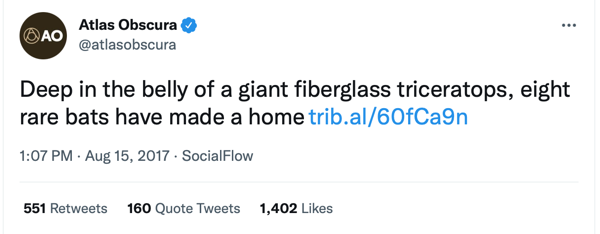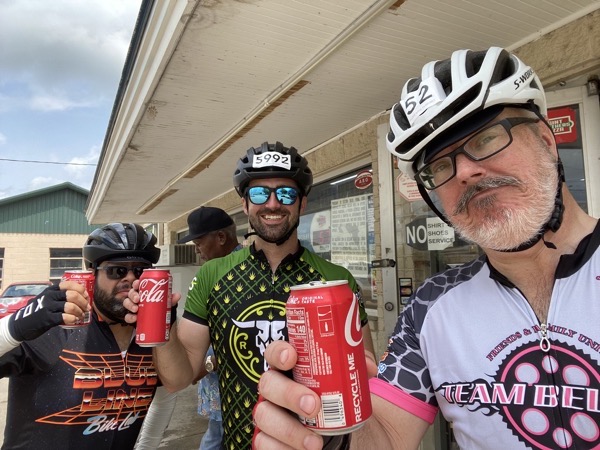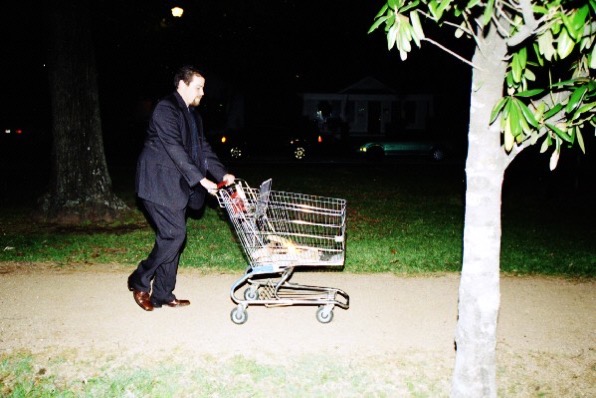Ten days ago, on 9 January, I showed up at Memorial Hermann’s Ortho Hospital at five goddamn o’clock in the morning, taking my last steps on a hip that looks like this. It was still dark.

I was no small amount of nervous. Sure, I had much more invasive surgery 8 years ago, when the initial repair happened, but it was on an emergency basis; I had no time to ruminate over it. This time it was a countdown for a month and a half, since we’d decided to push it off until after the holidays.
I can’t decide if it was disconcerting or calming that, for them, it was just another Monday. Total hip replacements are a dime a dozen now; the procedure itself usually takes less than 2 hours. So we were there, and we did a brief amount of paperwork, and then I went upstairs for prep.

I joke that, at this point in the process, I was probably cleaner than I had ever been, and this is because for scheduled surgical procedures in this era of infection, they have you scrub the bejesus out of yourself the night before with super-strong antibacterial soap and a sterile, hospital-issued sponge — and then get up on the day of the procedure and do it again. The stuff was harsh, and my skin felt weird, but I guess the weirdness tells you it’s working.
BUT WAIT THERE’S MORE, because as soon as I was upstairs in a prep area, my first task after stripping was to — you guessed it — wipe my whole person down AGAIN with antibacterial wipes.
I say that; ACTUALLY the first memorable task for ME in that moment was this:

For about 18 months, I’ve had a lift in my left shoe, owing to the gradual but serious bone loss at the top of my left leg. That’s why I’ve limped; that’s one reason I’ve needed a cane since Christmas 2021. And one key change on deck for January 9 was the re-levelilng of my legs, so this little bastard gets to go into a landfill somewhere. Good riddance.
What followed as the usual rigmarole of blood draws and IV lines and etc. I had few moments to myself, but it did seem proper in 2023 to commemorate with a final pre-surgical old-hip selfie:

Then? Well, then things get fuzzy. The anesthesiologist came in and started prepping me for the spinal block, and the main nurse came back and hit me with a couple things in the IV, one of which was Versed which, among other things, interferes with memory. By this point Erin was with me, and tells me I was saying I wanted to remember as much as possible, but nothing is really clear past the moment I expressed anxiety about the process of the spinal block. There are fragments. I think I remember being wheeled down the hall and into the actual OR, but it’s really fuzzy.
From my perspective, I blinked, and I was waking up in the recovery area, mildly confused. The same nurse saw me and said “Yep, it’s all over! You did fine!” I should note that, surgically speaking, it really WAS a blink, because as mentioned above a THR is now routinely a sub-2-hour process. That blows my mind, but I could see a clock from my bed and it was only about 10:30AM at this point, and by then I was lucid enough to, well, look at a clock and remember the time.
I ate ice chips for 90 minutes or so as they monitored me, & especially my blood pressure, and by noon they were wheeling me into a private recovery room where Erin was waiting.

Now the full court press started: a THR is now an outpatient procedure, so the goal was to get me out the door before EOD. However, for that to happen, a series of medical providers had to visit, and I had to meet certain postsurgical milestones.
I was visited by — in keeping with the happily-still-lingering season — THREE POSTSURGICAL GHOSTS:
- THE GHOST OF PUTTING ON YOUR SOCKS WITHOUT BENDING OVER: an occupational therapist, who walked me through the aides I’d be sent home with (more later) to work around my immediate movement limitations;
- THE GHOST OF PERPETUAL EXHALATION: a pulmonary person of some sort, who instructed me on the World’s Worst Bong aka the Incentive Spirometer — instruction I didn’t actually need, since this wasn’t my first rodeo with an I.S (it was, however, fun the be able to peg the thing; turns out I do still have some residual cardio fitness);
- THE GHOST OF “FUCK IT LET’S MAKE HIM WALK:” a physical therapist, who got me up and WALKING (using a wheeled walker) while I’m pretty sure my lower half was still drunk — I know for a FACT I was still tipsy from anesthesia because I was struggling to articulate myself with her, which made the whole thing frustrating despite also being successful.
BTW, let me tell you it’s super weird to stand up on a new hip joint and realize that, while you DO have pain — after all, they just CUT YOU OPEN AND EDITED YOUR SKELETON — it’s an entirely different pain, and the pain that’s plagued you for a year from the joint’s deterioration is now gone.
And the whole while the milestones loomed. I had to
- Eat. To that end, I was given the World’s Saddest Sandwich and chips, which was weirdly cruel since with drugs still in my system the combo of “untoasted white bread” and “cottonmouth” was deeply unfun. Even so, eating post-surgery is required because of the number of people who have postsurgical nausea problems. I do not.
- Drink. Same song, different verse. I drank SO MUCH WATER that afternoon, owing I suppose to my assiduous adherence to the presurgical protocol of no food/drink after 9pm the previous night. Normally, I drink a LOT of water, so I was definitely dehydrated — which, of course, complicated the final milestone…
- PEE, because postsurgical kidney function is a thing, too.
I didn’t pee until probably 3:30, but once I had it was as if someone with a mighty clipboard had made the final tickmark, and the Great Medical Machine began the process of disgorging me back to the real world.
The chief complicating factor of this entire affair was the fact that, owing the scar tissue from the entry points of the initial 2014 repair, my surgeon had to do a posterior approach instead of the more modern and apparently less invasive anterior approach. This is all fancy medical jargon, but what it means is “where do you unzip Chet to swap out the parts.” With anterior, the incision would be just inside the relevant hip bone, and down into your groin, but, as stated, this was off the table.
Instead, we went posterior which was through, well, my posterior. (It actually wraps around to the outside of my leg, but that’s the term.) With this approach, enough of the muscular structure is disturbed that there is a real risk of dislocating the implant early on, so my main admonition is DO NOT BEND AT THE WAIST, TWIST, or OTHERWISE STRESS THAT JOINT for at least 6 weeks.
I follow instructions super well, so that’s what we’re doing. Plus, it comes with benefits, such as an insurance-provided long-handled claw grabber that I promise I have not goosed Erin with more than once or twice.
However, in the immediate surgical aftermath, when worries were highest, Erin realized that our sporty little VW was very low to the ground indeed, so she called our neighbor and local Taco Saint Mallory. They have two taller vehicles, so Mallory braved 5:00 traffic to drive over and pick me up in their Grand Cherokee, which was much more comfortable. Then, upon arrival at home, we realized that Mal had also brought a Giant Bag of Tacos in his capacity as a Taco Magnate — along with a paloma for Erin, which was well deserved indeed.
The long and short of it is that the whole affair lasted about twelve hours — the nighttime pic above was taken at 4:53AM; I was at home in my lounge chair by 5PM, taco and Athletic Brewing Free Wave NA IPA in hand. Hilariously, by about 6 I had nodded off in the chair and spilled about 15% of said near-beer, but on a day that could’ve had a shitton more unpleasant mishaps, I’ll take it.















